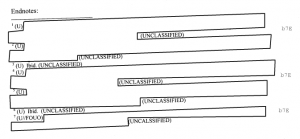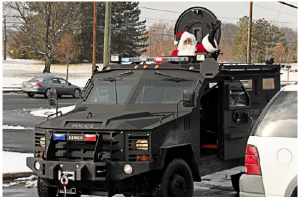Two Years after Missing Abdulmutallab because of a Spelling Variance, Government Missed Tsarnaev because of a Spelling Variance
On the Sunday shows yesterday, House Intelligence Chair Mike Rogers suggested that the government missed Tamerlan Tsarnaev’s trip to Russia in 2012 because he used an alias. This morning, Lindsey Graham explained that the problem was slightly different. Tamerlan’s travel documents misspelled his name.
“He went over to Russia, but apparently, when he got on the Aeroflot plane, they misspelled his name,” Graham, a South Carolina Republican said on Fox television this morning. “So it never went into the system that he actually went to Russia.”
Graham, a member of the Armed Services Committee, said in answer to a follow-up question that he did not know whether Tsarnaev, the 26-year-old terrorist suspect who died early Friday following a shootout with law enforcement, had misspelled his name on purpose.
The FBI “said Aeroflot gave us the information” that Tsarnaev had traveled there, Graham said, though he did not specify when that occurred.
Now, Lindsey doesn’t appear to know whether misspelling was the government’s or Aeroflot’s fault or Tamerlan’s deceit. Assuming Lindsey’s right about the larger point, whatever the source, a misspelling suggests a very different issue than an outright alibi (which would raise questions about the documents Tamerlan used, rather than the tracking of those documents).
Update: At the very end of the Senate Judiciary Committee Immigration hearing, Chuck Schumer said the error arose from Aeroflot typing in Tamerlan’s name incorrectly, so it appears it was not an attempt to deceive by Tamerlan.
Two years before Tsarnaev departed for Russia in January 2012, the government spent a good deal of time reviewing what prevented the government from responding to the several warnings about Umar Farouk Abdulmutallab, the UndieBomber, to prevent him from traveling to the country. One of the problems (though by no means the most serious one), was that the cable conveying warnings from Abdulmutallab’s father spelled his name wrong.
As was widely reported within hours of the failed bombing attempt, Abdulmutallab’s father—a former Nigerian government minister and prominent banker—went to the US embassy in Abuja in November to warn that his son was involved with radical Islamists in Yemen and had broken off contact with his family. The family said they had given US officials extensive information about their son in the expectation that they would “find and return him home.”
In his prepared statement to the House Committee on Homeland Security on January 27, State Department Under-Secretary for Management Patrick Kennedy said: “In the case of Umar Farouk Abdulmutallab, on the day following his father’s November 19 visit to the Embassy, we sent a cable to the Washington intelligence and law enforcement community through proper channels (the Visas Viper system) that ‘Information at post suggests [Farouk] may be involved in Yemeni-based extremists.’”
Kennedy confirmed that all US intelligence agencies received warnings that Abdulmutallab was training with terrorists in Yemen. He noted that the initial diplomatic cable from Abuja misspelled Abdulmutallab’s name.
As I said, that was not the most important problem leading to missed warnings. But it was one identified in the lessons learned period.
Yet it appears likely that one of the potential (if Tamarlan’s trip ends up showing any contact with extremists, which it hasn’t yet) lessons learned here will be one we purportedly learned 3 years ago: that our software needs to be better at using wildcards to identify close but not exact spellings.
We’re already seeing hints that facial recognition may not have served as the miracle solution it often gets sold as. It now appears we might not even have the databases running our watchlist system working as well as it needs to.
Update: Swapped out the Politico version of this report for the BoGlo one, which was more informative and changed the language to reflect the additional information.



